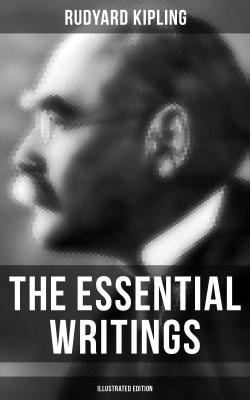ТОП просматриваемых книг сайта:
The Essential Writings of Rudyard Kipling (Illustrated Edition). Редьярд Киплинг
Читать онлайн.Название The Essential Writings of Rudyard Kipling (Illustrated Edition)
Год выпуска 0
isbn 9788027245956
Автор произведения Редьярд Киплинг
Жанр Языкознание
Издательство Bookwire
The "We're Heres" promptly went through the crowd as a body-guard, and it was a very white and shaken Harvey that they propped up on a bench in an anteroom.
"Favours his ma," was Mrs. Troop's only comment, as the mother bent over her boy.
"How d'you suppose he could ever stand it?" she cried indignantly to Cheyne, who had said nothing at all. "It was horrible—horrible! We shouldn't have come. It's wrong and wicked! It—it isn't right! Why—why couldn't they put these things in the papers, where they belong? Are you better, darling?"
That made Harvey very properly ashamed. "Oh, I'm all right, I guess," he said, struggling to his feet, with a broken giggle. "Must ha' been something I ate for breakfast."
"Coffee, perhaps," said Cheyne, whose face was all in hard lines, as though it had been cut out of bronze. "We won't go back again."
"Guess 'twould be 'baout's well to git daown to the wharf," said Disko. "It's close in along with them Dagoes, an' the fresh air will fresh Mrs. Cheyne up."
Harvey announced that he never felt better in his life; but it was not till he saw the "We're Here", fresh from the lumper's hands, at Wouverman's wharf, that he lost his all-overish feelings in a queer mixture of pride and sorrowfulness. Other people—summer boarders and such-like—played about in cat-boats or looked at the sea from pier-heads; but he understood things from the inside—more things than he could begin to think about. None the less, he could have sat down and howled because the little schooner was going off. Mrs. Cheyne simply cried and cried every step of the way, and said most extraordinary things to Mrs. Troop, who "babied" her till Dan, who had not been "babied" since he was six, whistled aloud.
And so the old crowd—Harvey felt like the most ancient of mariners—dropped into the old schooner among the battered dories, while Harvey slipped the stern-fast from the pier-head, and they slid her along the wharf-side with their hands. Every one wanted to say so much that no one said anything in particular. Harvey bade Dan take care of Uncle Salters's sea-boots and Penn's dory-anchor, and Long Jack entreated Harvey to remember his lessons in seamanship; but the jokes fell flat in the presence of the two women, and it is hard to be funny with green harbour-water widening between good friends.
"Up jib and fores'l!" shouted Disko, getting to the wheel, as the wind took her. "See you later, Harve. Dunno but I come near thinkin' a heap o' you an' your folks."
Then she glided beyond ear-shot, and they sat down to watch her up the harbour. And still Mrs. Cheyne wept.
"Psha', my dear," said Mrs. Troop; "we're both women, I guess. Like's not it'll ease your heart to hev your cry aout. God He knows it never done me a mite o' good; but then He knows I've had something to cry fer!"
Now it was a few years later, and upon the other edge of America, that a young man came through the clammy sea-fog up a windy street which is flanked with most expensive houses built of wood to imitate stone. To him, as he was standing by a hammered iron gate, entered on horseback—and the horse would have been cheap at a thousand dollars—another young man. And this is what they said:
"Hello, Dan!"
"Hello, Harve!"
"What's the best with you?"
"Well, I'm so's to be that kind o' animal called second mate this trip. Ain't you most through with that triple-invoiced college o' yours?"
"Getting that way. I tell you, the Leland Stanford Junior isn't a circumstance to the old "We're Here"; but I'm coming into the business for keeps next fall."
"Meanin' aour packets?"
"Nothing else. You just wait till I get my knife into you, Dan. I'm going to make the old line lie down and cry when I take hold."
"I'll resk it," said Dan, with a brotherly grin, as Harvey dismounted and asked whether he were coming in.
"That's what I took the cable fer; but, say, is the doctor anywheres araound? I'll draown that crazy nigger some day, his one cussed joke an' all."
There was a low, triumphant chuckle, as the ex-cook of the "We're Here" came out of the fog to take the horse's bridle. He allowed no one but himself to attend to any of Harvey's wants.
"Thick as the Banks, ain't it, doctor?" said Dan, propitiatingly.
But the coal-black Celt with the second-sight did not see fit to reply till he had tapped Dan on the shoulder, and for the twentieth time croaked the old, old prophecy in his ear:
"Master—man. Man—master," said he. "You remember, Dan Troop, what I said? On the 'We're Here'?"
"Well, I won't go so far as to deny that it do look like it as things stand at present," said Dan. "She was an able packet, and one way an' another I owe her a heap—her and dad."
"Me too," quoth Harvey Cheyne.
Kim
Chapter I
'Oh ye who tread the Narrow Way
By Tophet-flare to Judgment Day,
Be gentle when the heathen pray
To Buddha at Kamakura!'
He sat, in defiance of municipal

